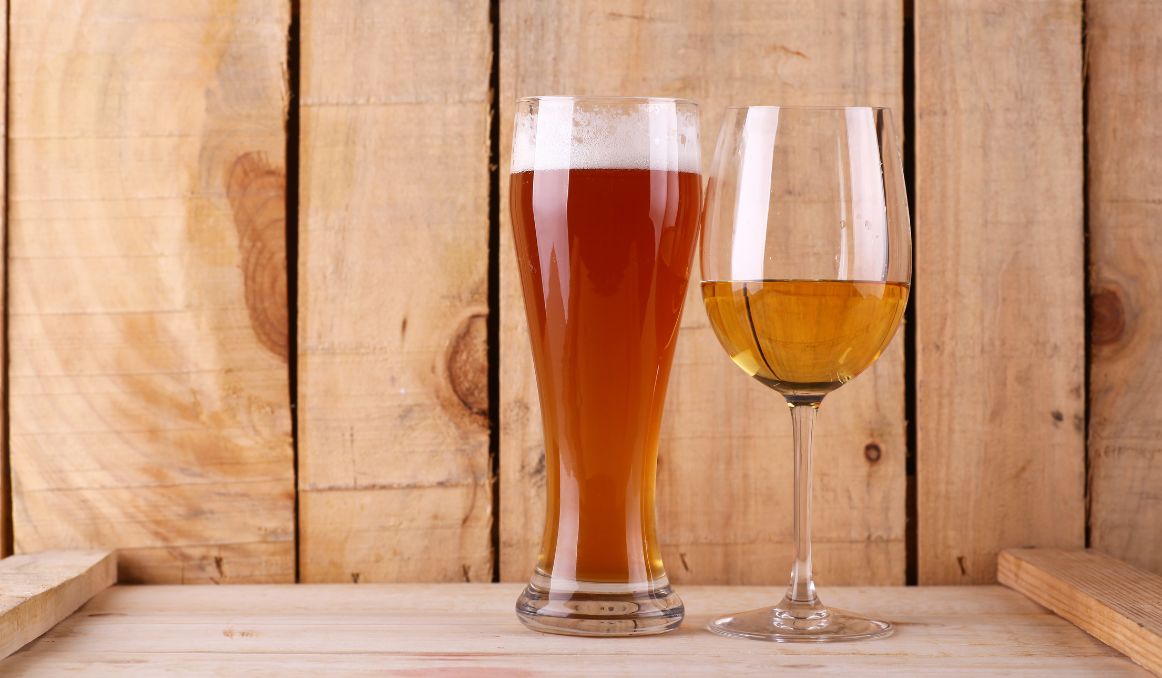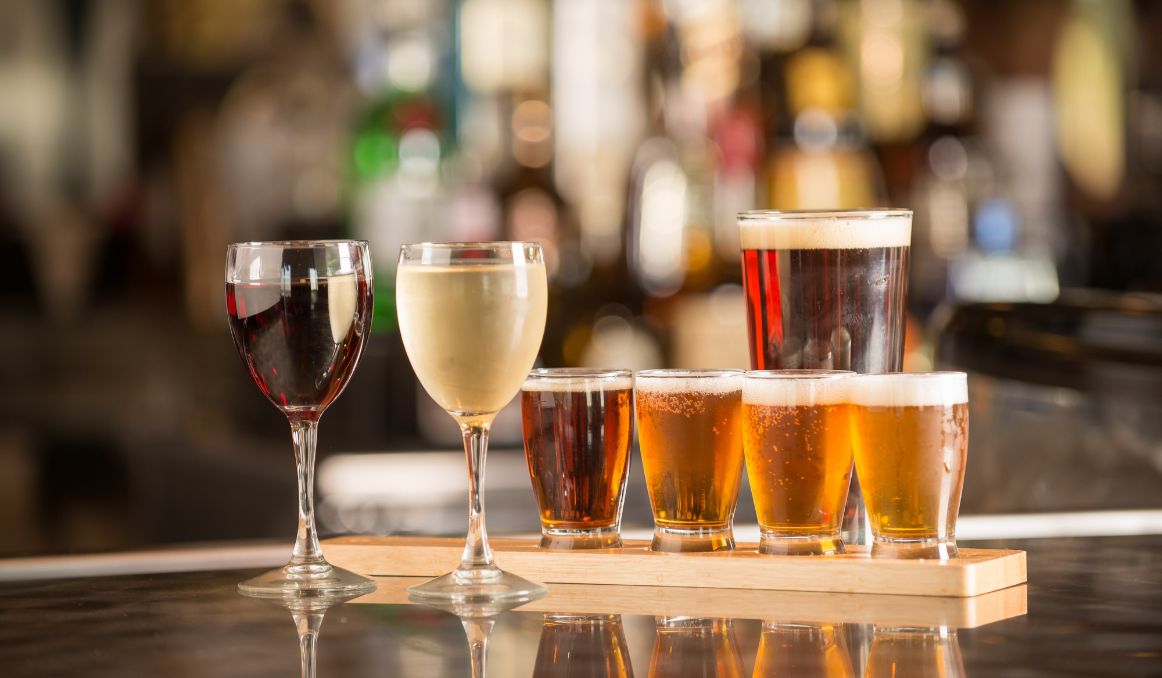Which Is Healthier: Beer or Wine?
It’s an age old question. Which is healthier: beer or wine?
Beer drinkers are going to say beer, of course. And wine drinkers are going to tout the benefits of wine over beer. No surprises there.
And the data is murky because of all the complexities of fermentation and the downsides of drinking alcohol in general.
So, to answer this question, or at least attempt to, we have to break down the data we have on hand.

Health Benefits of Beer
We start with beer because of its history as an actual nutritional supplement for families for centuries.
Data shows us, when broken down, that beer has tremendous health and nutrition benefits.
Beer has just as many antioxidants as wine (although they contain different types of antioxidants), it is high in protein and Vitamin B, and it provides iron, calcium, phosphate, and (low quantities of) fiber to our diets.
Beer drinkers on average suffer from fewer cardiovascular events, fewer kidney stones, and have less bad cholesterol.
Beer can also reduce stress, strengthen bones, and improve memory and cognitive function.
All of these benefits have been studied extensively in moderate beer drinkers, meaning a few drinks a week, typically limited to one or fewer drinks per day.
History of Beer
It is important to remember that beer began as bread or barley meal when humans were just settling down to domestic life, growing crops and irrigating field for the first time in human history.
Cereal grains were originally used simply to make meals as they were toasted to make them sweeter, ground with water, and herbs were added.
Fermentation took place by accident, and a low alcohol beverage was added to the family meal.
Many hundreds of years later as waterways were polluted with toxins from overpopulation and poor hygiene and waste management, beer became the only safe beverage to drink.
Fermentation made water safe by adding alcohol, which cleared out any potentially harmful toxins.
Add to that fact the reality of food shortages, and the grains in beer were often the only nutrition a family could get in a day, saving the lives of countless undernourished children.
Beer was, for a long time, not only a nice treat but in fact a healthy drink.
Health Benefits of Wine
As for wine, the biggest health benefits are those antioxidants, which are packed into this beverage thanks to the grapes and the yeast. Both prevent heart attacks to a great degree.
Red wine increases levels of good cholesterol and lowers bad cholesterol. Resveratrol in wine also contributes to lower levels of inflammation and blood clotting.
A 2018 study has also shown wine to decrease risks of atherosclerosis, hypertension, some cancers, and type 2 diabetes.
Further, the pholyphenols in wine have been linked to improved gut health, which also means better brain health because of the brain gut connection.
History of Wine
The history of wine is not as clear as that of beer in terms of health.
Sure, in many cultures, wine has been drunk with meals for millennia. Indeed, wine has been around for much longer than beer, thanks to the ease with which this drink can be made.
The likeliest explanation for the discovery of wine is that a farmer left grapes in a container to store, the grapes were crushed at the bottom of the barrel, and one daring adventurer drank the fermented juice that resulted.
BAM.
Now you have wine.
It was delicious, high in alcohol, and therefore created a wonderful euphoric effect.
Wine was then used in ceremony and ritual, offered to the gods, and passed around at feasts.
But it has never really been touted historically as a lifesaving beverage.
Disadvantages to Be Considered
There are, of course, the disadvantages to drinking alcohol at all, which applies to beer, wine, and anything with ethanol in it that has been fermented.
A recent study came out of the WHO that shows “no level of alcohol consumption is safe for our health.”
It has been labeled as a Group 1 carcinogen, given the highest level of risk, and linked to several types of cancer, including breast cancer in women.
These studies and the advice sent out by the WHO are aimed at ameliorating the damage done by those who abuse alcohol. It seems that moderation leads very quickly to overconsumption and the glorification of drinking alcohol to cope with the everyday struggles of life, which have only gotten more intense in recent years.
So, while we consider what health benefits we can get from beer or wine, we also must consider that we can get those same benefits today, antioxidants, vitamins, and minerals, from other foods that have no downsides, like oatmeal, whole wheat sourdough, red grapes, or even grape juice.
In short, while we can tout the benefits we get from enjoying the occasional alcoholic beverage, be it beer or wine, we should not be turning to beer or wine for health benefits when we can get them from much safer places.
Which is healthier: beer or wine? It’s a Toss Up

In the end, it’s a toss up between beer and wine as to which is healthier.
The truth is that neither beverage is healthy.
They are not health drinks, nor should they be considered as such.
But, if we are to ask, instead, which of these beverages has the most benefits when compared to its risks, the answer is probably going to be beer just because of the sheer number of nutrients packed into ancient grains like barley, wheat, and oats. Grapes don’t even come close.
And again, the reality is that if you are going to enjoy your favorite beverage, wine or beer, just enjoy it as a treat, a fun social experience with friends, or a delicious drink out on a date with your loved one.
Not everything has to be about breaking down the health benefits.
It could just as easily be argued that having a beer or glass of wine out with friends or on a date is a huge boost to your health for the shared experience of community and love.
Which is where all the health benefits are, really.
Cheers!
Passionate about the beer and/or wine making process? So are we! If you’re interested in finding out how you can use our technology to control fermentation and monitor your yeast, save work hours and improve the cost-efficiency of your business, drop us a line at [email protected] or check out our product pages:
- Oculyze BB 2.0 (Better Brewing) Yeast Cell Counter App + Hardware
- Oculyze FW (Fermentation Wine) Yeast Cell Counter App + Hardware
Also, you can now get access to a fully functional demo account to test your yeast via our Web App. Completely free of charge and with no commitment to purchase.
Sources:
- https://www.piedmont.org/living-better/the-health-benefits-of-beer
- https://www.mayoclinic.org/diseases-conditions/heart-disease/in-depth/red-wine/art-20048281
- https://timesofindia.indiatimes.com/life-style/health-fitness/diet/10-reasons-beer-is-not-bad-for-you/articleshow/18515996.cms
- https://pubmed.ncbi.nlm.nih.gov/10940346/
- https://www.who.int/europe/news/item/04-01-2023-no-level-of-alcohol-consumption-is-safe-for-our-health
Stay on top on important fermentation insights – subscribe to our monthly newsletter and receive a hand-picked selection of our most relevant articles straight to your inbox.
Never miss a beat and get real time updates with a new article each workday by subscribing our social media channels.
Instagram | Facebook | Twitter | YouTube


